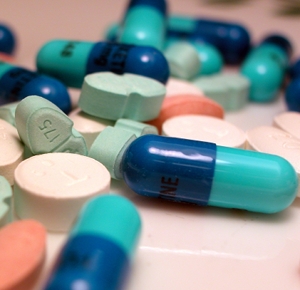 Breast-feeding has become extremely popular in recent years, and for good reason. Benefits for infants in terms of overall health, protection against disease, and improved growth are well known. Along with the wonderful sense of bonding experienced by mothers, breast-feeding also enhances your health and may even help prevent some forms of cancer.
Breast-feeding has become extremely popular in recent years, and for good reason. Benefits for infants in terms of overall health, protection against disease, and improved growth are well known. Along with the wonderful sense of bonding experienced by mothers, breast-feeding also enhances your health and may even help prevent some forms of cancer.
Although breast-feeding is the “natural” way to go, and a win–win choice for you and your baby, it requires great care and vigilance to make sure that your breast milk is of the highest quality and free of contaminants. Just as when you’re pregnant, it’s important to avoid using any drug that could have a harmful effect on your baby. But does this mean that you can’t take any medications at all? Certainly not! In fact, if you let an illness go untreated, it could be much more harmful to your baby than the presence of a minute amount of a medication in your breast milk. The key is to check with your doctor first to make sure that any prescription or nonprescription medication you plan to use is safe for nursing mothers.
What are the “ground rules”?
You can make breast-feeding as safe as possible for your baby by taking these steps:
• A medication that is safe for use during pregnancy may not be safe during breast-feeding, so check with your doctor after the baby is born.
• Medications that are safe for an infant to use are generally safe for nursing mothers, but, again, check with your doctor.
• Consider whether your condition (eg, headache, muscle pain, minor cold or allergy) really requires medical therapy: Try to find alternatives such as a heating pad or a cold compress. However, don’t dismiss a severe headache or neglect an illness that could worsen; you need to be in top form to nurse your baby.
• If you must take medication, choose the one that is safest for the baby. For example, acetaminophen (Tylenol and others) is generally preferable to aspirin for headaches and muscle pain.
• Whenever possible, use a topical form of a medication (cream, ointment, lotion, vaginal or rectal suppository) instead of an oral form, because less of the topical form will find its way into breast milk.
• Whenever possible, take medication just after nursing.
• If you must use a potentially risky medication, ask your doctor and/or pediatrician about monitoring drug levels in the baby’s blood.
Which drugs are the safest?
Most antibacterials, antivirals, anti-epileptics, antihypertensives, nonsteroidal anti-inflammatory drugs (NSAIDS), anticoagulants, and prednisone compounds are usually safe in breast-fed infants.
You can become pregnant while you’re breast-feeding (despite the common myth that suggests otherwise), so you should use some type of contraception if you want to avoid another pregnancy right away. Although birth-control pills are generally considered safe for nursing mothers, their effects on breast milk vary widely depending on the type. Estrogen in these pills may decrease the quantity of breast milk, so a progestin-only “mini- pill” may be preferred.
What if I have a chronic medical condition?
If you need to take medication every day, you may still be able to nurse your baby if you’re willing to try dosage adjustments and alter- native medications if necessary.
Allergies. Old standards (eg, Benadryl, Sudafed) are considered safe for use during breast-feeding. Nonsedating antihistamines (eg, Allegra, Claritin) are okay for short-term use. Over the long term, though, a steroid nasal spray (eg, Beconase, Flonase) or a cromolyn nasal spray (Nasalcrom) or inhaler (Intal) may be preferred.
Asthma. Inhaled steroids (eg, Flovent, Tilade) are a good bet. Oral steroids have been used for many years, and are considered safe during breast-feeding.
Heart disease. Standard medications, including diuretics, beta-blockers (eg, Inderal, Lopressor), calcium channel blockers (eg, Calan, Procardia), and ACE inhibitors (eg, Vasotec), are considered safe in breast-fed infants.
Diabetes. Most nursing mothers can use insulin or other drugs (eg, Glucotrol, Micronase, Orinase, Precose) without undue worry. However, you may want to avoid using Actos, Avandia, or Glucophage until more studies on their safety have been performed.
Epilepsy. Dilantin, Depakote, and Tegretol are considered preferable to other antiepileptic medications in terms of safety in breast-fed infants. However, nursing infants of Depakote and Tegretol users should undergo regular monitoring of liver function and blood cell counts.
Psychiatric conditions. Failure to take medication for certain disorders may hurt both you and your baby. The American Academy of Pediatrics describes the effects of nearly all antidepressants, anti-anxiety drugs, and antipsychotic drugs as “unknown but of possible concern.” In practice, some of these medications can be used safely if you and your baby are monitored carefully and dosages and drug selection are adjusted when necessary.
Depression. Most antidepressants are considered safe for use during breast-feeding, but the tricyclics (eg, Elavil, Norpramin, Pamelor) and selective serotonin reuptake inhibitors (eg, Prozac, Zoloft) are favored. Less information is available on the safety of Desyrel, Effexor, Serzone, and Wellbutrin in breast-fed infants.
Anxiety. Shorter-acting medications such as Ativan, Restoril, and Xanax are preferred over Valium, which stays in the mother’s system for a longer period of time.
Psychosis. Haldol and Thorazine are the best choices for nursing mothers, but only in low doses. Lithium use is not recommended; if it’s absolutely necessary, infants’ blood concentrations should be monitored.
Which medications are prohibited?
Women who use anticancer medications or illicit drugs (eg, amphet- amines, cocaine, heroin, marijuana, PCP) should not breastfeed. Those who need to take a radioactive compound (eg, gallium, iodine, technetium) for a diagnostic test or cancer treatment should stop nursing temporarily. Aspirin, bromocriptine, ergotamine, and phenobarbital should be used with great caution.
Is there any other advice?
• Avoid drinking alcohol; if you do have a drink, have it right after nursing.
• Try to avoid consuming caffeine, which can build up in your baby’s system and cause nervousness, irritability, and poor feeding. One cup of coffee in the morning is probably okay, but it’s better to switch to decaffeinated coffee, tea, and soft drinks.
• Don’t smoke near babies. It increases the risk of sudden infant death syndrome (SIDS), and it can also reduce milk production and restrict weight gain by the infant.
• Keep nursing if you get a cold, the flu, or a bacterial infection. By the time you experience symptoms of these illnesses, your baby has probably already been exposed. Also, your baby can receive helpful antibodies through your milk.
• If you can’t breastfeed while you’re ill, express your milk so that it can be refrigerated and used as needed.
• You can continue to nurse if you have mastitis (infection of the breast). Even with severe infections and breast abscesses, you need to stop breast-feeding for only a short period.
• Silicone breast implants probably have no harmful effects on breast milk or the nursing process. • Don’t breast-feed if you have human immunodeficiency virus (HIV) infection or tuberculosis. It may not be advisable to nurse if you have had breast cancer.
Breast-feeding is prohibited in very few medical situations. In most cases, you can work with your doctor to find medications that will control your symptoms while allowing you and your baby to enjoy all of the benefits of nursing.
This Patient Handout was prepared by Patricia L. Van Horn using materials from the American Academy of Pediatrics (www.aap.org) and the American Academy of Family Physicians (http://home.aafp.org).
[download id=”1″ format=”2″]





